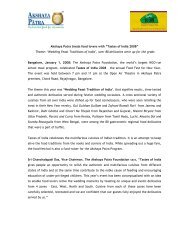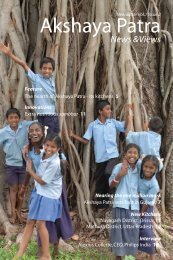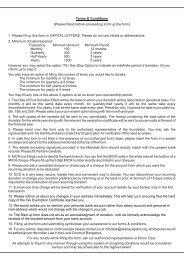The Top 100 NGOs 2013. - Akshaya Patra
The Top 100 NGOs 2013. - Akshaya Patra
The Top 100 NGOs 2013. - Akshaya Patra
You also want an ePaper? Increase the reach of your titles
YUMPU automatically turns print PDFs into web optimized ePapers that Google loves.
sPecial FeaTure sPecial FeaTure<br />
15 12<br />
= 9<br />
hQ locaTion: Tanzania hQ locaTion: uniTeD sTaTes hQ locaTion: France<br />
hQ locaTion: uniTeD sTaTes<br />
In the popular imagination, the link between rats and<br />
human well-being is a negative one, shaped by fears of<br />
disease. In the hands of APOPO, however, the equation<br />
has been reversed. Based in Morogoro, the humanitarian<br />
organization has spent the last 15 years honing its unique<br />
approach to training rats as mine detectors, and exported<br />
this ‘technology,’ despite initial skepticism, to four countries<br />
in Africa and South East Asia. Cheaper, quicker and lighter<br />
than conventional de-mining methods, APOPO’s African<br />
Giant Pouched Rats – endemic to sub-Saharan Africa – have<br />
helped return more than 6 million square meters of suspected<br />
minefields to local populations in Mozambique alone.<br />
<strong>The</strong> organization has also continued to innovate, diversifying<br />
into the field of public health by training the same<br />
‘HeroRATs’ to detect tuberculosis in human sputum samples<br />
– a faster, more accurate diagnostic method capable of<br />
screening thousands of patients every month.<br />
© sylvain Piraux/aPoPo © rooT caPiTal © william Daniels/hanDicaP inTernaTional<br />
© PeTer Biro / <strong>The</strong> irc<br />
11 12 13<br />
14<br />
APOPO Root Capital Handicap International IRC<br />
Training raTs To save lives invesTing in <strong>The</strong> ‘missing miDDle’ ProTecTing <strong>The</strong> DigniTy anD righTs oF <strong>The</strong> DisaBleD<br />
liFesaving assisTance To reFugees<br />
© sylvain Piraux For aPoPo © rooT caPiTal © sylvain Piraux For aPoPo<br />
© rooT caPiTal<br />
<strong>The</strong> gloBal Journal + January & FeBruary 2013<br />
While the global ‘credit crunch’ has shifted the<br />
playing field in recent years, there was a time when<br />
it seemed the world was awash in easy capital. As<br />
William Foote realized during travels in Mexico, however,<br />
small and medium-sized rural businesses in the developing<br />
world were often caught in a quandary – considered too<br />
small and risky for mainstream banks, and too large for the<br />
burgeoning microfinance movement. Returning to Boston,<br />
Foote went on to launch Root Capital in 1999 as a non-profit<br />
social investment fund targeting grassroots businesses in the<br />
“missing middle.”<br />
By the beginning of 2012, the organization had disbursed<br />
over $460 million in loans to sustainable enterprises in Africa<br />
and Latin America, reaching 2.6 million people in poor,<br />
environmentally vulnerable rural communities. Beyond<br />
managing two innovative investment portfolios, Root Capital<br />
has also multiplied its impact by delivering targeted<br />
financial advisory services and catalyzing a wider market<br />
in rural financing.<br />
Imagine living through the devastation and debilitating<br />
burden of conflict or natural disaster. Now imagine<br />
the same scenario through the eyes of a person with<br />
disabilities. Founded on the Thai-Cambodian border in 1982<br />
as a response to landmine injuries suffered by refugees fleeing<br />
the Khmer Rouge, Handicap International provides crucial<br />
assistance to acutely vulnerable people in dire situations of<br />
poverty, exclusion, war and disaster, taking action and raising<br />
awareness to respond to their essential needs, improve their<br />
living conditions and promote respect for their dignity and<br />
fundamental rights.<br />
Comprising a network of eight national associations active in<br />
over 60 countries, the organization has been rightly lauded<br />
for its deep impact on the lives of a previously underserved<br />
constituency – from relief to demining, rehabilitation to social<br />
inclusion and anti discrimination – as well as its tireless and<br />
transformative advocacy work, including as a co-founder of<br />
the International Campaign to Ban Landmines.<br />
<strong>The</strong>gloBalJournal.neT<br />
54 55<br />
Founded in 1933 at the request of none other than Albert<br />
Einstein, the New York-based International Rescue<br />
Committee offers lifesaving care and life-changing<br />
assistance to refugees forced to flee from war or disaster.<br />
Evolving into one of the world’s leading humanitarian<br />
agencies providing emergency relief, rehabilitation,<br />
protection, resettlement services and advocacy, the<br />
organization works in over 40 countries worldwide, as well as<br />
managing the Surge Protection Project in collaboration with<br />
the United Nations High Commissioner for Refugees.<br />
Though highly respected for its rapid and reliable response<br />
to crisis situations, the International Rescue Committee is<br />
also committed to laying the groundwork for lasting peace<br />
and economic development. For instance, the organization<br />
has been working with Japanese fishermen in the wake of the<br />
devastation left behind by the 2011 tsunami, as well as helping<br />
undercapitalized local farmers in Zimbabwe access global<br />
markets through the ‘Tabasco’ initiative in partnership with<br />
the McIlhenny Company.





